Asian Centre Facilities Booking Request Form
Please be aware that submitting this form DOES NOT CONFIRM your booking. You will be contacted shortly by the Asian Studies Booking Coordinator to discuss your inquiry.
Please be aware that submitting this form DOES NOT CONFIRM your booking. You will be contacted shortly by the Asian Studies Booking Coordinator to discuss your inquiry.
Publication title: Perception of Lexical Tones by Homeland and Heritage Speakers of Cantonese
Publication year: 2022
Author: Zoe Wai-Man Lam
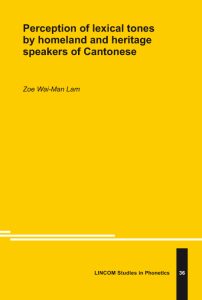 About the book
About the book
Perception of Lexical Tones by Homeland and Heritage Speakers of Cantonese compares the lexical tone perception abilities of two populations with different bilingual configurations: Cantonese-dominant adults who grew up in Hong Kong (referred to as homeland speakers), and English-dominant adults who grew up in a Cantonese-speaking household in Canada (heritage speakers). From infancy both were exposed to Cantonese as a first language in terms of chronological order; however, after the onset of schooling, each became dominant in the majority language of their respective society.
Given this background, this research project investigates whether heritage speakers’ perception of lexical tones of a non-dominant first language (Cantonese) exhibits cross-language effects from a dominant second language (English) that does not have a contrastive dimension of tone. Results of a series of perception experiments indicate that homeland speakers have a significantly greater ability to distinguish tonally contrastive words by solely relying on tonal information. Both groups showed confusion of overlapping subsets of tone pairs, but heritage speakers had a higher error percentage, which suggests a quantitative but not qualitative difference between the two groups. Lastly, the two groups used different listening strategies in tone identification.
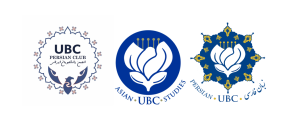
دپارتمان آسیاپژوهی
دانشگاه بریتیش کلمبیا
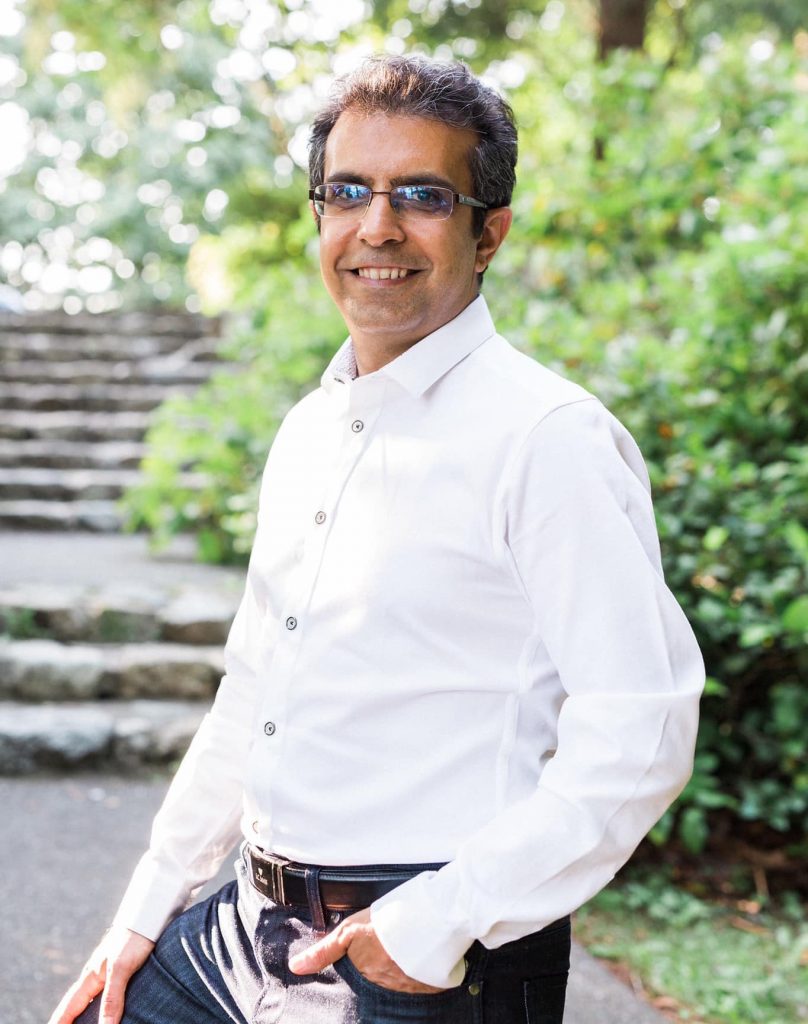 زندهیاد علیرضا احمدیان، محقق، تحلیلگر و فعال فرهنگی، اجتماعی و سیاسی و از اعضای محبوب و مورداحترام جامعه ایرانی-کانادایی بود. وی دانشآموختهٔ دانشگاه بریتیش کلمبیا (یوبیسی) و از جمله افراد بسیار تأثیرگذار در شکلگیری و راهاندازی گروه زبان فارسی و ایرانشناسی در این دانشگاه بود.
زندهیاد علیرضا احمدیان، محقق، تحلیلگر و فعال فرهنگی، اجتماعی و سیاسی و از اعضای محبوب و مورداحترام جامعه ایرانی-کانادایی بود. وی دانشآموختهٔ دانشگاه بریتیش کلمبیا (یوبیسی) و از جمله افراد بسیار تأثیرگذار در شکلگیری و راهاندازی گروه زبان فارسی و ایرانشناسی در این دانشگاه بود.
دپارتمان آسیاپژوهی دانشگاه بریتیش کلمبیا در سال ۲۰۱۹، عنوان مجموعه سخنرانیهای ایرانشناسی دانشگاه را (که پیشتر و در سپتامبر ۲۰۱۸ راهاندازی شده بود)، به پاس کوششهای ارزشمند زندهیاد علیرضا احمدیان، به نام ایشان تغییر داد. در سال ۲۰۱۹، تنی چند از دوستان علیرضا احمدیان ضمن ارائهٔ حمایت سخاوتمندانهٔ مالی از این رویداد مهم دانشگاهی، امکان برگزاری این سخنرانیها را تا پایان سال تحصیلی ۲۰۲۵-۲۰۲۶ فراهم ساختند.
سالانه بین ۴ تا ۶ جلسهٔ سخنرانی با حضور اساتید و صاحبنظران حوزههای مختلف ایرانشناسی و فارسیپژوهی در قالب این مجموعه سخنرانی برگزار میشود. برخی از این جلسات حضوری و بعضی دیگر آنلاین خواهند بود. علاقهمندان میتوانند جهت شرکت در هر جلسه، فرم مخصوص آن جلسه را تکمیل و ثبتنام کنند تا در جریان اخبار مرتبط با آن جلسه قرار بگیرند.
۲۰۱۸ | ۲۰۱۹ | ۲۰۲۰ | ۲۰۲۱ | ۲۰۲۲
شنبه، ۳ دسامبر ۲۰۲۲ (آنلاین – به انگلیسی)
سخنران: دکتر دَنیِل پاتس، استاد باستانشناسی و تاریخ خاور نزدیک، دانشگاه نیویورک
طرف بحث: دکتر لیلا دیبا، مورخ هنر، محقق مستقل؛ دکتر ویلِم فلور، ایرانشناس، محقق مستقل
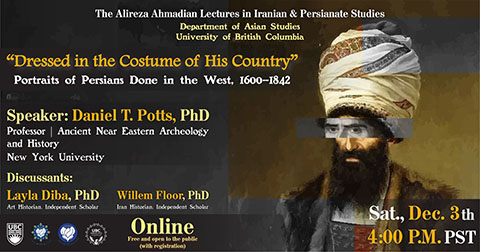
شنبه، ۱۹ نوامبر ۲۰۲۲ (آنلاین – به انگلیسی)
سخنران: دکتر پَملا کریمی، استاد تاریخ هنر و سرپرست کالج هنرهای تجسمی و نمایشی دانشگاه ماساچوست در دارتموث
طرفبحث: دکتر هوشنگ شهابی، استاد افتخاری دانشکده تاریخ دانشگاه سنت اندروز
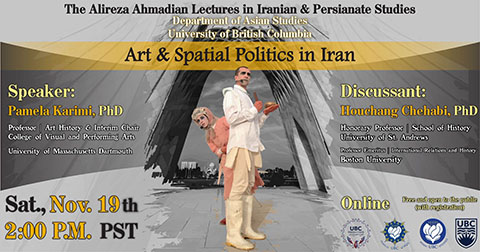
جمعه، ۱۴ اکتبر ۲۰۲۲ (یوبیسی، میدان رابسون – به انگلیسی)
سخنران: دکتر دومِنیکو اینجِنیتو، دانشیار ادبیات فارسی در دانشگاه کالیفرنیا، لس آنجلس
این سخنرانی بهدلیل شرایط پیشبینینشده لغو شد.
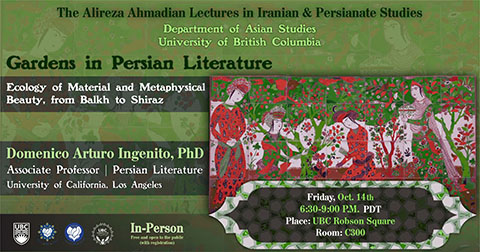
شنبه، ۱۸ ژوئن ۲۰۲۲ (آنلاین – به انگلیسی)
سخنران: دکتر حسام دهقانی، استادیار زبان و فرهنگ فارسی، دانشگاه بریتیش کلمبیا
طرفبحث: مجیب مهرداد، نویسنده و شاعر، کابل
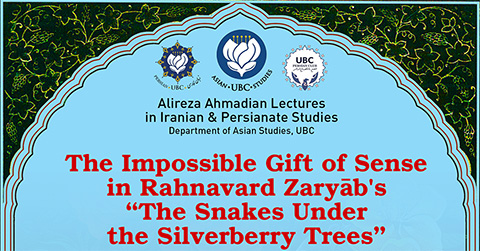
شنبه، ۲۸ مه ۲۰۲۲ (آنلاین – به انگلیسی)
سخنران: دکتر مارتا سیمیدچیِوا، دانشکدهٔ هنرهای آزاد و مطالعات حرفهای، دانشگاه یورک
طرفبحث: دکتر ندیم اختر، استاد مدعو زبان فارسی، گروه تاریخ، دانشگاه آشوکا
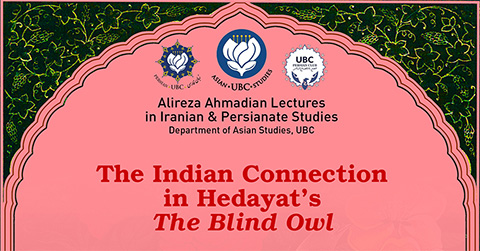
شنبه، ۱۴ مه ۲۰۲۲ (آنلاین – به انگلیسی)
سخنران: دکتر بهنام فومشی، پژوهشگر دانشگاه مانَش
طرفبحث: دکتر مِری هوبِر، استادیار ادبیات فارسی و تطبیقی دانشگاه استنفورد
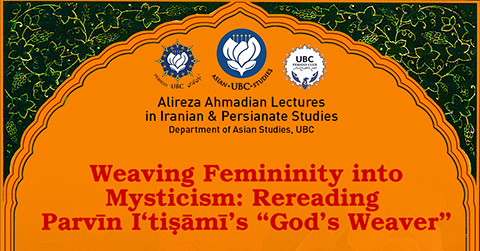
شنبه، ۲ آوریل ۲۰۲۲ (آنلاین – به انگلیسی)
سخنرانان: دکتر رِبِکا گولد، استاد و پژوهشگر جهان اسلام و ادبیات تطبیقی، دانشگاه بیرمنگام؛ دکتر کیوان طهماسبیان، پژوهشگر ادبیات جهان، دانشگاه بیرمنگام
طرفبحث: دکتر ساموئل هاجکین، پژوهشگر ادبیات جهان، دانشگاه بیرمنگام
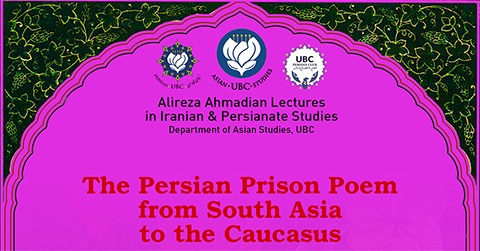
شنبه، ۵ مارس ۲۰۲۲ (آنلاین – به انگلیسی)
سخنران: دکتر ژانت اَفاری، استاد گروه مطالعات دینی در دانشگاه کالیفرنیا، سانتا باربارا
طرفبحث: دکتر حسن جوادی، استاد بازنشسته، دانشگاه کالیفرنیا، برکلی
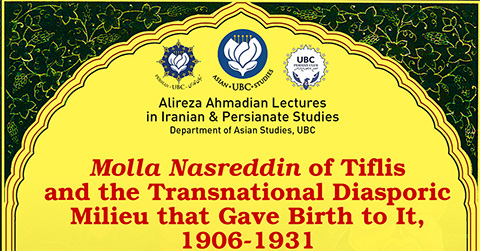
شنبه، ۲۶ فوریه ۲۰۲۲ (آنلاین – به انگلیسی)
سخنران: دکتر ویلِم فلور، ایرانشناس، محقق مستقل
طرفبحث: دکتر نادر مهرآوری، کالج علوم کشاورزی و محیط زیست، دانشگاه کالیفرنیا، دیویس
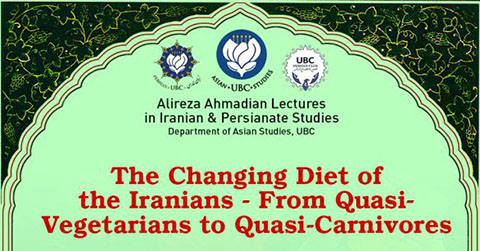
شنبه، ۵ فوریه ۲۰۲۲ (آنلاین – به فارسی)
سخنران: دکتر فرزانه آقاپور، استادیار، گروه زبان و ادبیات فارسی، دانشگاه گیلان
طرفبحث: دکتر سودابه شکراللهزاده، استادیار گروه آموزش و پرورش دانشگاه علامه طبلاطبائی
این سخنرانی بهدلیل شرایط پیشبینینشده لغو شد.
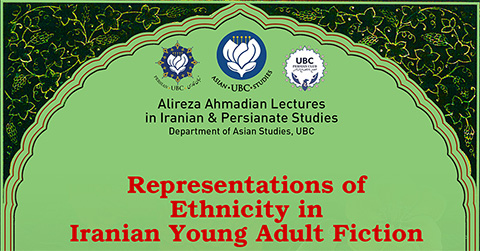
شنبه، ۱۸ دسامبر ۲۰۲۱ (آنلاین – به انگلیسی و فارسی)
سخنرانان: دکتر مهدی گنجوی، محقق، نویسنده و ویراستار، کتابخانه روبارتس، دانشگاه تورنتو؛ میثم علیپور، رماننویس و کارشناس ارشد مطالعات هنر، دانشگاه تهران
طرفبحث: دکتر پگاه شهباز، پژوهشگر پسادکتری، مرکز مطالعات جنوب آسیا، موسسه آسیایی، دانشکده امور جهانی و سیاست عمومی، دانشگاه تورنتو
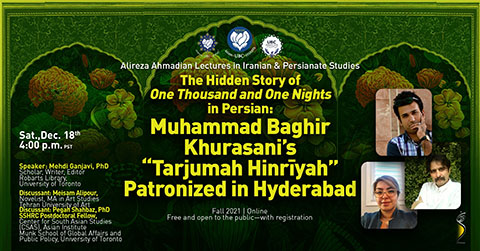
شنبه، ۴ دسامبر ۲۰۲۱ (آنلاین – به انگلیسی)
سخنران: دکتر ایمان احمدیان، پژوهشگر، دانشگاه نیوکاسل
طرفبحث: دکتر حسام دهقانی، استادیار زبان و فرهنگ فارسی، دانشگاه بریتیش کلمبیا
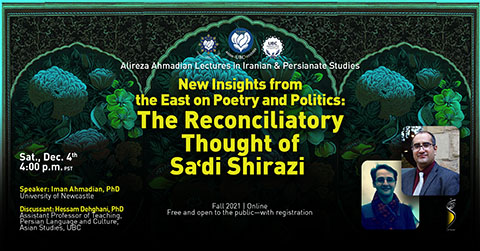
شنبه، ۲۰ نوامبر ۲۰۲۱ (آنلاین – به انگلیسی)
سخنران: دکتر دومِنیکو اینجِنیتو، دانشیار ادبیات فارسی، دانشگاه کالیفرنیا، لس آنجلس
طرفبحث: دکتر جاستین لَنداو، دانشیار زبانها و تمدنهای خاور نزدیک، دانشگاه هاروارد
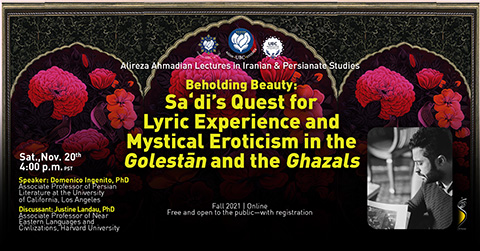
شنبه، ۶ نوامبر ۲۰۲۱ (آنلاین – به انگلیسی)
سخنران: دکتر فیروزه کاشانی ثابت، استاد تاریخ، دانشگاه پنسیلوانیا
طرفبحث: دکتر بَرینگتِن واکِر، استاد تاریخ، دانشگاه ویلفرید لوریه
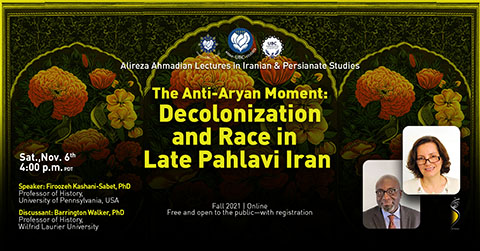
شنبه، ۲۳ اکتبر ۲۰۲۱ (آنلاین – به انگلیسی)
سخنران: دکتر نیلوفر حائری، استاد مردمشناسی، دانشگاه جان هاپکینز
طرفبحث: مهتاب سیردانی، دانشجوی دکتری انسانشناسی اجتماعی و فرهنگی، دانشگاه بوستون
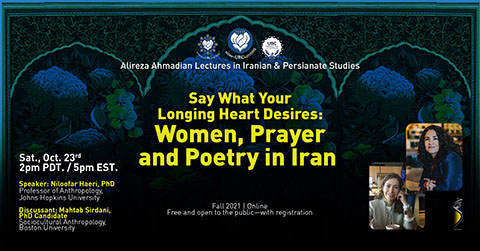
شنبه، ۱۶ اکتبر ۲۰۲۱ (آنلاین – به انگلیسی)
سخنران: دکتر ناهید صیامدوست، استادیار مطالعات رسانه و مطالعات خاورمیانه، دانشگاه تگزاس در آستین
طرفبحث: دکتر نیکی اخوان، دانشیار، مطالعات رسانه و ارتباطات، دانشگاه کاتولیک آمریکا
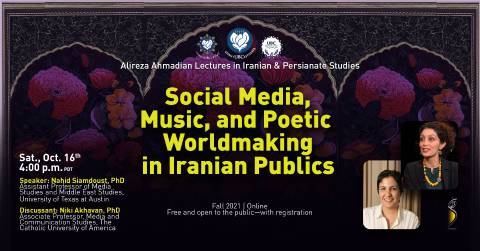
شنبه، ۲ اکتبر ۲۰۲۱ (آنلاین – به انگلیسی)
سخنران: دکتر نِبیل حسین، استادیار گروه مطالعات دینی، دانشگاه میامی
طرفبحث: دکتر جواد هاشمی، پژوهشگر اخلاق پزشکی، دانشکده پزشکی هاروارد، دانشجوی دکتری مطالعات اسلامی، دانشگاه هاروارد
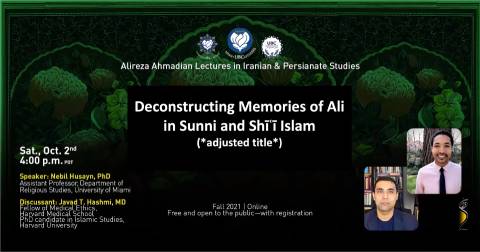
شنبه، ۲۵ سپتامبر ۲۰۲۱ (آنلاین – به انگلیسی)
سخنران: دکتر لَتیشیا نَنکِت، مدرس ارشد، دانشگاه نیو ساوت ولز، سیدنی
طرفبحث: دکتر اِیمی مطلق، دانشیار ادبیات تطبیقی و مطالعات خاورمیانه و جنوب آسیا، دانشگاه کالیفرنیا، دیویس
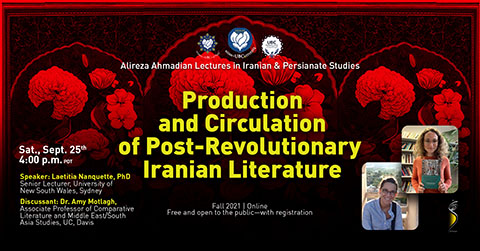
شنبه، ۲۵ سپتامبر ۲۰۲۱ (آنلاین – به انگلیسی)
سخنران: دکتر نَوینا نقْوی، استادیار فرهنگهای اسلامی فارسیزبان جنوب آسیا، دانشگاه بریتیش کلمبیا
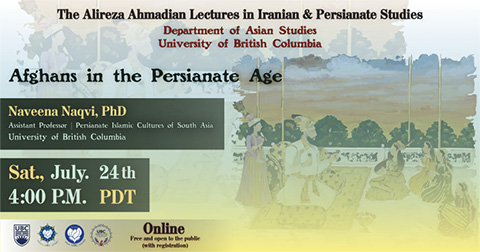
شنبه، ۲۹ مه ۲۰۲۱ (آنلاین – به انگلیسی)
سخنران: مهدیه ولیزاده، دانشجوی دکتری ادبیات تطبیقی، دانشگاه تورنتو
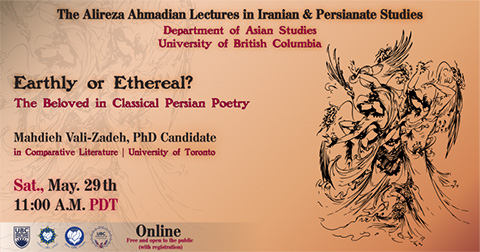
شنبه، ۱۵ مه ۲۰۲۱ (آنلاین – به انگلیسی)
سخنران: دکتر مرجان موسوی، مدرس دانشگاه مریلند
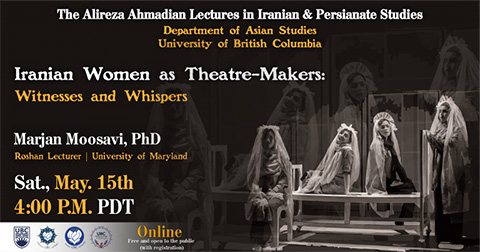
شنبه، ۲۴ آوریل ۲۰۲۱ (آنلاین – به انگلیسی)
سخنران: دکتر سالور ملایری، دکترای زبانهای مدرن، دانشگاه سنت اندروز
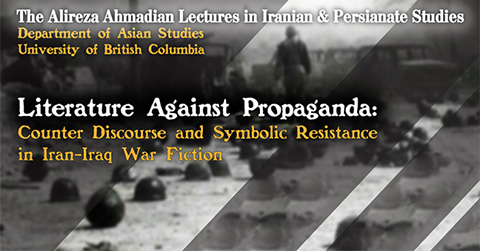
شنبه، ۱۰ آوریل ۲۰۲۱ (آنلاین – به فارسی)
سخنران: دکتر لیلا صادقی، دکتری زبانشناسی دانشگاه تهران
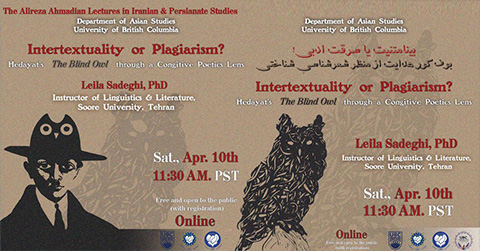
شنبه، ۲۷ مارس ۲۰۲۱ (آنلاین – به انگلیسی)
سخنران: دکتر امید آزادی بوگر، دانشگاه عادی هونان، چین
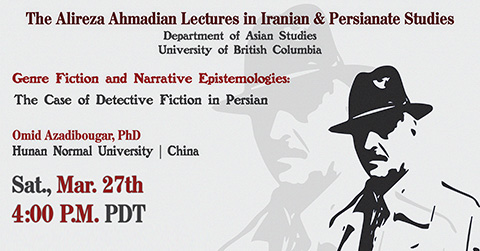
شنبه، ۱۳ مارس ۲۰۲۱ (آنلاین – به انگلیسی)
سخنران: دکتر آیدا مفتاحی، استادیار تاریخ، دانشگاه ایالتی بویزی
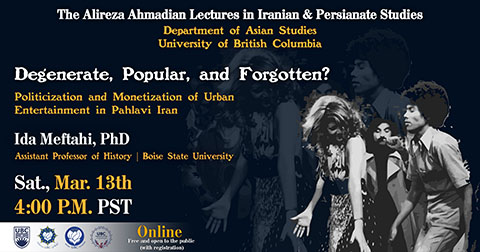
شنبه، ۲۷ فوریه ۲۰۲۱ (آنلاین – به انگلیسی)
سخنران: دکتر ناهید صیامدوست، استادیار مدعو مطالعات زنان و انسانشناسی دین، دانشکده الهیات هاروارد
این سخنرانی بهدلیل شرایط پیشبینینشده لغو شد.
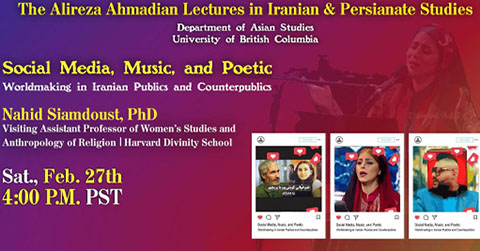
شنبه، ۱۳ فوریه ۲۰۲۱ (آنلاین – به انگلیسی)
سخنران: مرتضی عابدینیفرد، دانشجوی دکتری موسیقیشناسی، دانشگاه آلبرتا
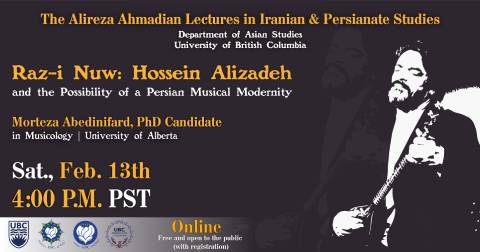
شنبه، ۳۰ ژانویه ۲۰۲۱ (آنلاین – به انگلیسی)
سخنران: دکتر فرشید کاظمی، پژوهشگر پسادکتری، دانشگاه سایمون فریزر
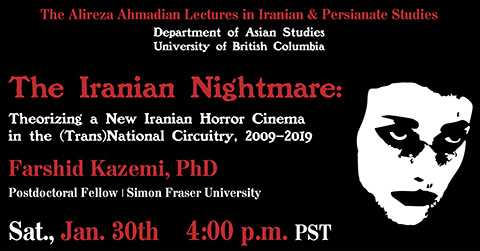
شنبه، ۱۶ ژانویه ۲۰۲۱ (آنلاین – به فارسی و انگلیسی)
سخنران: علی جنابان (فیلمساز)، الهام نائیج (دکترای دانشگاه نیو ساوت ولز، استرالیا) و امین پوربرقی (فیلمساز)
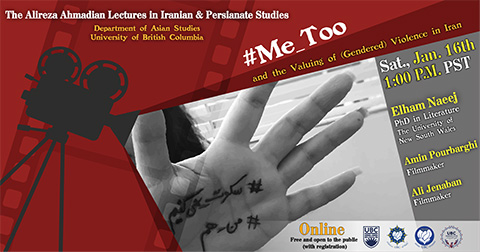
شنبه، ۱۲ دسامبر ۲۰۲۰ (آنلاین – به انگلیسی)
سخنران: دکتر مریم زهتابی ثابتی مقدم، دانشگاه ماساچوست در امهرست
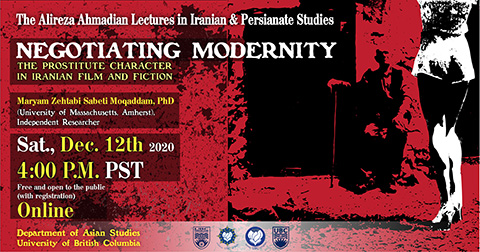
شنبه، ۲۸ نوامبر ۲۰۲۰ (آنلاین – به انگلیسی)
سخنران: دکتر راستین مهری، مدرس در موسسه آموزش زبان دانشگاه سايمون فريزر
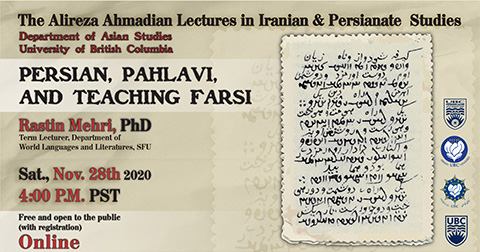
شنبه، ۱۴ نوامبر ۲۰۲۰ (آنلاین – به انگلیسی)
سخنران: دکتر کلودیا یعقوبی، دانشیار مطالعات فارسی، مؤسسه روشن، دانشگاه کارولینای شمالی در چپل هیل
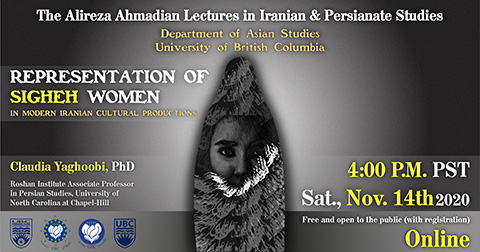
شنبه، ۳۱ اکتبر ۲۰۲۰ (آنلاین – به انگلیسی)
سخنران: دکتر بهرنگ نبوینژاد، مدرس تاریخ هنر، کالج کلمبیا، ونکوور
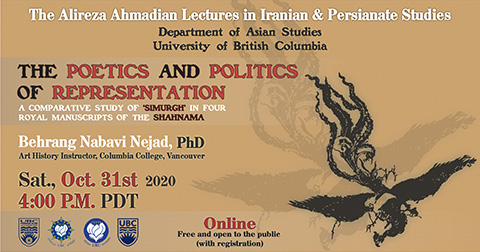
شنبه، ۱۷ اکتبر ۲۰۲۰ (آنلاین – به انگلیسی)
سخنران: دکتر امیرحسین وفا، استادیار ادبیات انگلیسی و ادبیات تطبیقی، دانشگاه شیراز
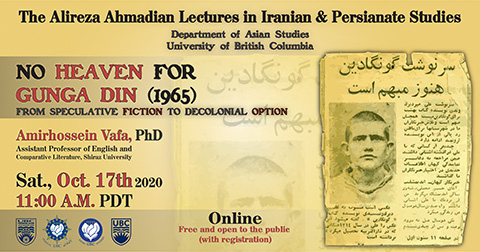
شنبه، ۲۶ سپتامبر ۲۰۲۰ (آنلاین – به انگلیسی)
سخنران: دکتر اِیمی طحانی بیدمشکی، استادیار بخش انگلیسی، کالج شهر پاسادینا، کالیفرنیا
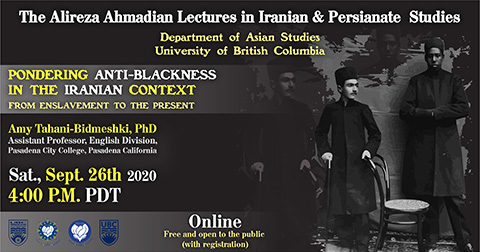
جمعه، ۳ آوریل ۲۰۲۰ (یوبیسی، ساختمان C. K. Choi – به انگلیسی)
سخنران: دکتر آزاده یمینی همدانی، دانشیار ادبیات جهان، دانشگاه سایمون فریزر
این سخنرانی بهدلیل شرایط پیشبینینشده لغو شد.
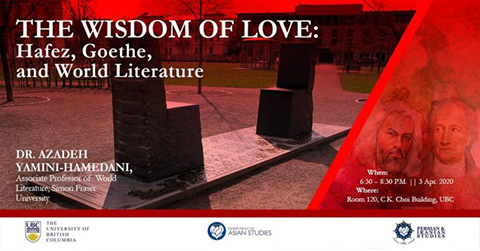
جمعه، ۱۳ مارس ۲۰۲۰ (یوبیسی، ساختمان C. K. Choi – به انگلیسی)
سخنران: دکتر راستین مهری، مدرس در موسسه آموزش زبان دانشگاه سايمون فريزر
این سخنرانی بهدلیل شرایط پیشبینینشده لغو شد.
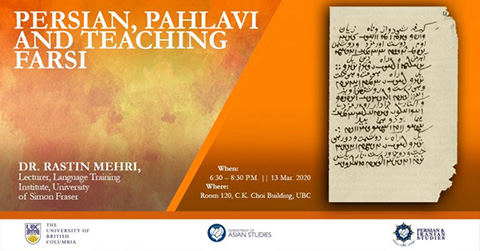
چهارشنبه، ۱۲ فوریه ۲۰۲۰ (یوبیسی، ساختمان C. K. Choi – به انگلیسی)
سخنران: دکتر پگاه شهباز، پژوهشگر پسادکتری دپارتمان آسیاپژوهی دانشگاه بریتیش کلمبیا
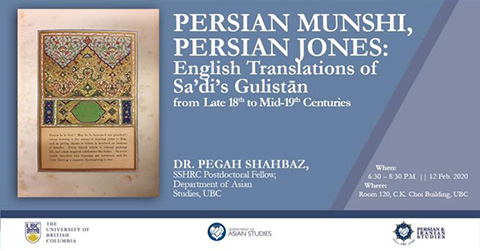
جمعه، ۳۱ ژانویه ۲۰۲۰ (یوبیسی، ساختمان C. K. Choi – به فارسی)
سخنران: دکتر راضیه رحیمی، دکترای معماری، دانشگاه ساویتریبای فوله پونا، هند
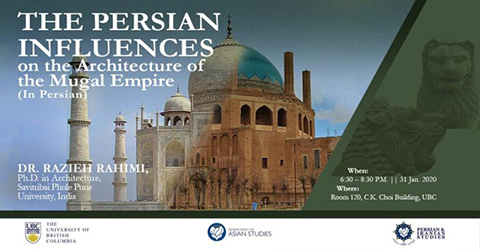
جمعه، ۱۷ ژانویه ۲۰۲۰ (یوبیسی، تالار دپارتمان آسیاپژوهی – به انگلیسی)
سخنران: دکتر گلبرگ رکابطلایی، استادیار تاریخ، دانشگاه سیتون هال
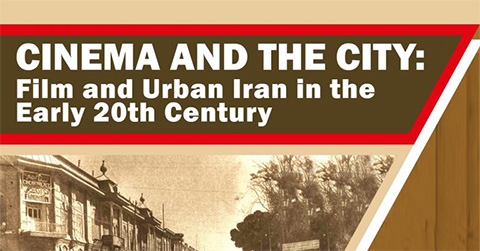
جمعه، ۲۹ نوامبر ۲۰۱۹ (یوبیسی، ساختمان C. K. Choi – به انگلیسی)
سخنران: دکتر کاوه فرخ، استاد تاریخ و مشاور دانشگاهی آنالیتیکا ایرانیکا، دانشگاه MGU، پاریس، فرانسه
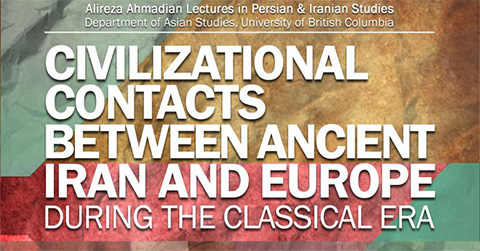
جمعه، ۸ نوامبر ۲۰۱۹ (یوبیسی، ساختمان C. K. Choi – به انگلیسی)
سخنران: دکتر مرتضی اسدی، محقق مدعو در دانشکده مطالعات بینالملل، دانشگاه سایمون فریزر، استادیار سابق اقتصاد دانشگاه خوارزمی، تهران
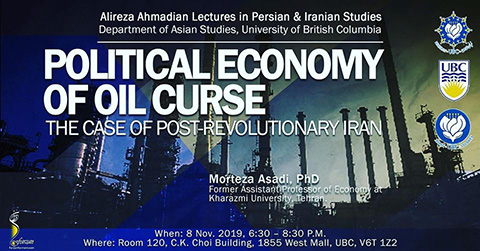
جمعه، ۲۵ اکتبر ۲۰۱۹ (یوبیسی، ساختمان C. K. Choi – به فارسی)
سخنران: دکتر فرزان کرمانی، دکترای طراحی، موسسه فناوری هند بمبئی
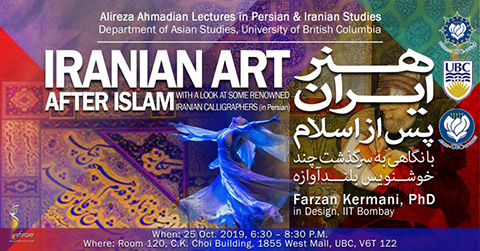
جمعه، ۱۱ اکتبر ۲۰۱۹ (یوبیسی، ساختمان C. K. Choi – به انگلیسی)
سخنران: دکتر شهزاد بشیر، استاد علوم انسانی اسلامی و مطالعات دینی، دانشگاه براون
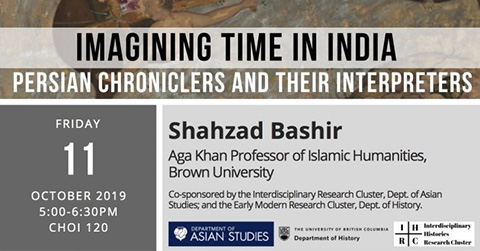
جمعه، ۴ اکتبر ۲۰۱۹ (یوبیسی، تالار دپارتمان آسیاپژوهی – به انگلیسی)
سخنران: دکتر تورج خدابخشی، دندانپزشک و موبد زرتشتی
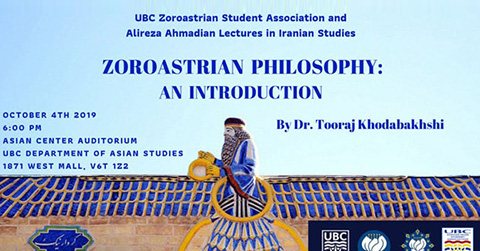
جمعه، ۲۷ سپتامبر ۲۰۱۹ (یوبیسی، میدان رابسون – به انگلیسی)
سخنران: دکتر دومینیک پرویز بروکشا، دانشیار ادبیات فارسی، دانشگاه آکسفورد
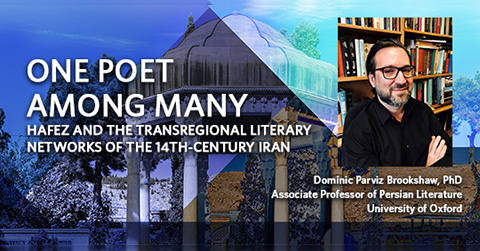
جمعه، ۱۳ سپتامبر ۲۰۱۹ (یوبیسی، ساختمان C. K. Choi – به فارسی)
سخنران: مهسا راد، دانشجوی دکتری روانشناسی، دانشگاه تربیت مدرس، تهران؛ دانشجوی پژوهشی بینالمللی در یو بی سی
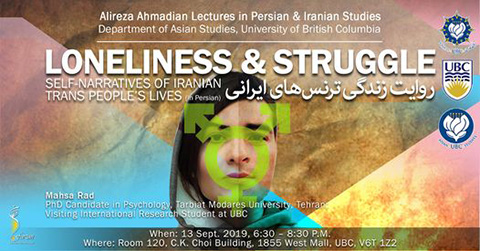
جمعه، ۲۹ مارس ۲۰۱۹ (یوبیسی، ساختمان C. K. Choi – به فارسی)
سخنران: دکتر آزاده مختارنامه، مدرس سابق زبان و ادبیات فارسی دانشگاه شیراز، ایران
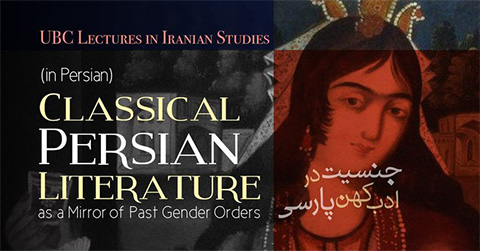
جمعه، ۲۲ مارس ۲۰۱۹ (یوبیسی، ساختمان C. K. Choi – به فارسی)
سخنران: دکتر نزهت احمدی، دانشیار گروه تاریخ، دانشگاه اصفهان
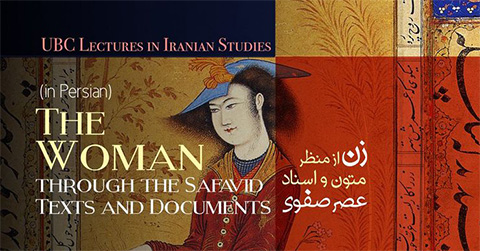
جمعه، ۱۵ مارس ۲۰۱۹ (یوبیسی، تالار دپارتمان آسیاپژوهی – به فارسی)
سخنران: نوژنگ خاتمی، دانشجوی دکتری، مدرس و پژوهشگر علوم سیاسی، دانشگاه بریتیش کلمبیا
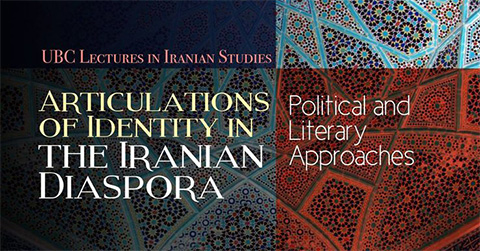
جمعه، ۱ مارس ۲۰۱۹ (یوبیسی، ساختمان C. K. Choi – به فارسی)
سخنران: کامبیز شریف، مجسمهساز
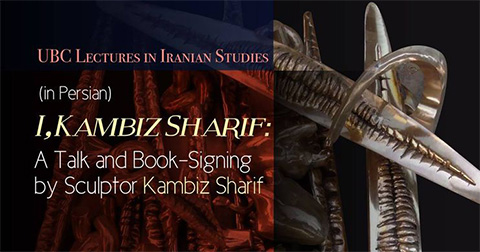
جمعه، ۸ فوریه ۲۰۱۹ (یوبیسی، تالار دپارتمان آسیاپژوهی – به فارسی و انگلیسی)
امیر اسلامی، نوازنده و آهنگساز، مدرس سابق دانشگاه هنر تهران؛ به همراه هامین هنری، نوازنده
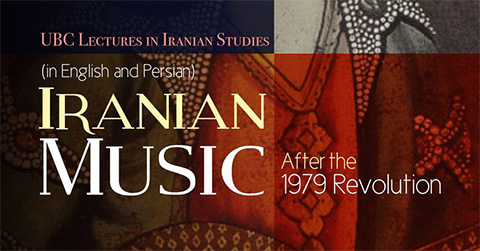
جمعه، ۲۵ ژانویه ۲۰۱۹ (یوبیسی، ساختمان C. K. Choi – به انگلیسی)
نمایش مستند به همراه پرسش و پاسخ؛ تِرِنس تِرنِر: فیلمساز کانادایی; پرویز تناولی: مجسمهساز ایرانی-کانادایی
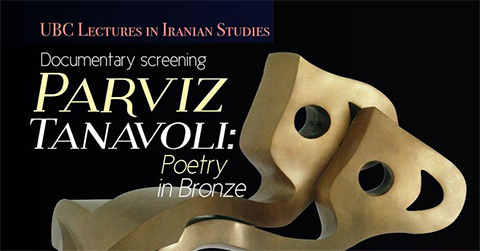
جمعه، ۱۶ ژانویه ۲۰۱۹ (یوبیسی، سالن Jack Poole – به انگلیسی)
حمید رحمانیان از چگونگی تبدیل شاهنامه به کتاب هنری، کتاب صوتی، کتاب پاپآپ و نمایش میگوید.
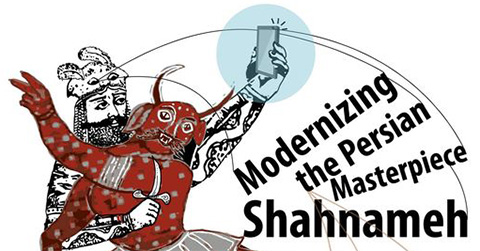
پنجشنبه، ۸ نوامبر ۲۰۱۸ (یوبیسی، تالار دپارتمان آسیاپژوهشی – به فارسی)
سخنران: محسن نامجو، خواننده – ترانهسرای ایرانی، محقق موسیقی و نوازندهٔ سهتار، ساکن شهر نیویورک، بهدعوت دپارتمان آسیاپژوهی و انجمن دانشجویان ایرانی یو بی سی
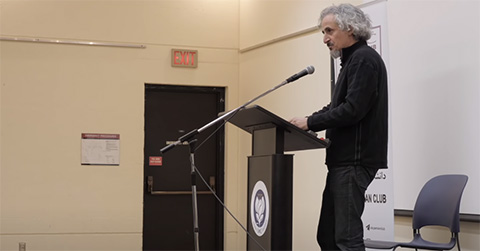
Publication title: The Deadly Intersections of COVID-19: Race, States, Inequalities and Global Society
Publication year: 2022
Editor: Sunera Thobani
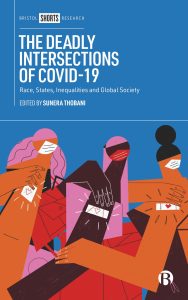
About the book
This pioneering book demonstrates the disproportionate impact of state responses to COVID-19 on racially marginalized communities.
Written by women and queer people of colour academics and activists, the book analyses pandemic lockdowns, border controls, vaccine trials, income support and access to healthcare across eight countries in North America, Asia, Australasia and Europe, to reveal the inequities within, and between countries.
Putting intersectionality and economic justice at the heart of their frameworks, the authors call for collective action to end the pandemic and transform global inequities.
Contributing to debates around the effects of COVID-19 – as well as racial capitalism and neoliberal globalization at large – this research is invaluable in informing future policy.
Application deadline: October 7, 2022
Date of posting: August 25, 2022
The Department of Asian Studies, University of British Columbia (Vancouver campus), invites applications for a tenure-track appointment at the rank of Assistant Professor in the field of Classical Persian Literature and Culture. Applicants with expertise in the history and practice of classical Persian literature and culture are welcome to apply; applicants with a commitment to the broader notion of ‘Persianate’ literary culture are especially encouraged to apply. Applicants are expected to have full professional proficiency in English and in Persian, and proficiency in at least one other language of the Persianate cosmopolis. A strong track record of participation in team work and program affairs, and experience in community outreach and program building is a plus.
Candidates must have a Ph.D. in a relevant field or expect to have successfully defended the dissertation before July 1, 2023. The successful candidate will be expected to demonstrate excellence in research and undergraduate and graduate teaching, and to maintain an active program of research, publication, teaching, graduate supervision, and service. The successful candidate will be expected to work closely with tenure-stream Asian Studies faculty in South Asian and Persianate and Islamic history and culture, and with any future hires in the area of Persian/Iranian Studies. Further information about the Department can be found on its website, www.asia.ubc.ca.
The application dossier should include:
The deadline for receipt of complete applications is October 7, 2022. The anticipated start date of employment is July 1, 2023.
This position is subject to final budgetary approval. Salary will be commensurate with qualifications and experience.
All application materials should be submitted electronically through the Department’s careers website, https://asia.ubc.ca/department/careers/ by October 7. Inquiries may be sent to asia.jobsearch@ubc.ca.
Equity and diversity are essential to academic excellence. An open and diverse community fosters the inclusion of voices that have been underrepresented or discouraged. We encourage applications from members of groups that have been marginalized on any grounds enumerated under the B.C. Human Rights Code, including sex, sexual orientation, gender identity or expression, racialization, disability, political belief, religion, marital or family status, age, and/or status as a First Nation, Métis, Inuit, or Indigenous person. All qualified persons are encouraged to apply; however, Canadian citizens and permanent residents of Canada will be given priority.
Given the uncertainty caused by the global COVID-19 pandemic, applicants must be prepared to conduct interviews remotely if circumstances require. A successful applicant may be asked to consider an offer containing a deadline without having been able to make an in-person visit to campus if travel and other restrictions are still in place.
Application deadline: March 9th, 2026
Date of posting: February 20th, 2026
The Department of Asian Studies, University of British Columbia (Vancouver Campus), invites applications for part-time sessional lecturers for the 2026 Summer Session to teach ASIX 340 (3) – Orientalism in Popular Culture.
For more details on courses, please see: https://vancouver.calendar.ubc.ca/course-descriptions/courses-subject. Schedules are to be determined.
A minimum of an MA in a related field and teaching experience in a related field at a North American college/university level is required.
The application dossier should include a letter of interest, CV, and the names and addresses of three referees. All application materials should be submitted online. The deadline for the receipt of application is by the end of day on March 9th, 2026.
For more information regarding the department please visit: http://asia.ubc.ca/ .
Applicants must be physically located and legally able to work in Canada for the duration of the appointment. All positions are subject to availability of funds and will be governed by UBC’s “Agreement on Conditions of Appointment for Sessional Faculty Members.” Equity and diversity are essential to academic excellence. An open and diverse community fosters the inclusion of voices that have been underrepresented or discouraged. We encourage applications from members of groups that have been marginalized on any grounds enumerated under the B.C. Human Rights Code, including sex, sexual orientation, gender identity or expression, racialization, disability, political belief, religion, marital or family status, age, and/or status as a First Nation, Métis, Inuit, or Indigenous person. All qualified persons are encouraged to apply; however, Canadian citizens and permanent residents of Canada will be given priority.
Publication title: The Catcher in the Loft
Publication year: 2019
Author: Ch’ŏn Un-yŏng
Translators: Bruce Fulton and Ju-Chan Fulton
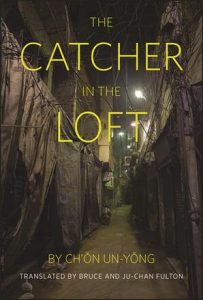 About the book
About the book
Inspired by the case of a torture specialist in 1980s South Korea who from 1988 to 2000 was a fugitive in his own house, The Catcher in the Loft (published in South Korea in 2011 as Saenggang) is in equal parts a portrait of a man coming to terms with his notorious past and a coming-of-age story centered in his dependent relationship with his college-age daughter, who has always thought of him as a patriotic policeman. The novel begins at breakneck speed, with a victim perishing under the torture artist’s (renamed An) watch, and a hurried decision that An must take cover. The remainder of the novel is a dual narrative related in turn by the torture artist and his daughter, Sŏn, who must harbor her father in a loft above her room. There follows a counterpoint of concealment (An) and revelation (Sŏn), with the daughter discovering the “festival” of her own body during an infatuation with a university classmate, followed by the sobering knowledge, manifested firsthand in her encounter with one of her father’s shattered victims, that the father she had idolized is a sado-masochist reduced to abject dependence on her for all of his daily needs during his concealment in the loft. When the novel ends, years later, the focus is equally on An’s ultimate capitulation (he turns himself in to the authorities) and Sŏn’s awakening to her autonomy.
Publication title: What is Korean Literature?
Publication year: 2020
Authors: Youngmin Kwon and Bruce Fulton
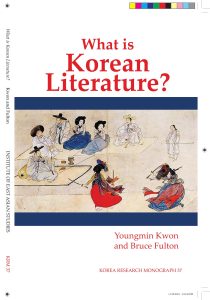
About the book
This volume outlines the major developments, characteristics, genres, and figures of the Korean literary tradition. It includes examples, in English translation, of each of the genres and works by several of the major figures discussed in the text. Both the classical and modern periods are covered. Korean literature developed in response to dynamic changes in popular life and culture taking place over the millennia, and as such it is an expression of the region’s distinctive history.
Publication title: Mina
Publication year: 2018
Author: Kim Sagwa
Translators: Bruce Fulton and Ju-Chan Fulton
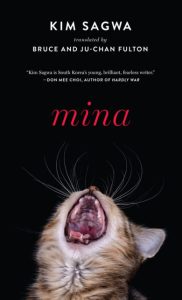 About the book
About the book
Crystal toils day and night to earn top grades at her cram school. She’s also endlessly texting, shopping, drinking, vexing her boyfriends, cranking up her mp3s, and fantasizing about her next slice of cheesecake. Her non-stop frenzy never quite manages the one thing that might calm her down: opening up about the pressures that are driving her to the edge. She certainly hasn’t talked with her best friend, Mina, nor Mina’s brother, whom she’s developing a serious crush on. And Crystal’s starting to lose her grip.
In this shocking English debut, award-winning Korean author Kim Sagwa delivers an astonishingly complex portrait of modern-day adolescence. With pitch-perfect dialogue and a precise eye for detail, Kim creates a piercingly real teen protagonist–at once powerful, vulnerable, and utterly confused. As one bad decision leads to another, this promising life spirals to a devastating climax.
Publication title: Sunset: A Ch’ae Manshik Reader
Publication year: 2017
Author: Ch’ae Manshik
Editors: Bruce Fulton and Ju-Chan Fulton
Translators: Bruce Fulton and Ju-Chan Fulton
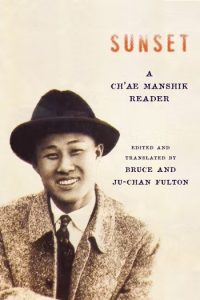
About the book
Ch’ae Manshik is one of the most accomplished modern Korean writers yet is underrepresented in English translation because of the challenges posed by his distinctive voice and colloquial style. Sunset: A Ch’ae Manshik Reader is the first English-language anthology of his works and features a variety of genres—novella, short fiction, anecdotal essay, travel writing, children’s story, one-act play, three-act play, and roundtable discussion.
This anthology moves beyond the usual “representative works” to provide a well-rounded selection of writing by one of Korea’s most innovative and memorable voices, drawing on Ch’ae’s ten-volume Complete Works. This edition also provides a comprehensive introduction outlining the limitations of existing approaches to Ch’ae. It contextualizes the anthology’s contents both in terms of the author’s career and the rich Korean tradition of intertextuality and intermediality that he reflects from the country’s earliest times to the new millennium.